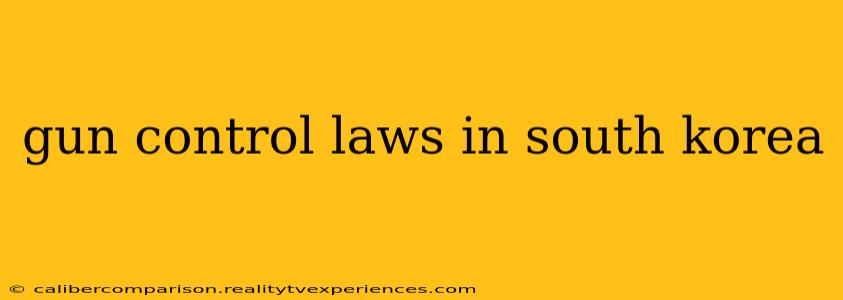South Korea boasts one of the strictest gun control regimes globally. Its low rates of gun violence stand in stark contrast to many Western nations, highlighting the effectiveness – and the complexities – of its approach. This post will delve into the specifics of South Korean gun laws, exploring their historical context, current regulations, and the societal factors contributing to their success.
The Historical Context of Gun Control in South Korea
South Korea's stringent gun laws weren't enacted overnight. They evolved significantly following the Korean War (1950-1953) and have been progressively tightened over the decades. The initial focus was on controlling the flow of weapons into the civilian population, stemming from the aftermath of the war and the ongoing geopolitical tensions with North Korea. The government implemented rigorous licensing and registration procedures, laying the groundwork for the current system.
Current Gun Control Laws in South Korea: A Detailed Overview
South Korea’s gun control framework is multifaceted and remarkably strict. Key aspects include:
Licensing and Ownership Restrictions:
- Extremely restrictive licensing: Obtaining a firearm license is exceptionally difficult. Applicants undergo extensive background checks, including psychological evaluations, and must demonstrate a compelling reason for gun ownership, usually limited to hunting or sport shooting.
- Limited types of firearms: The types of firearms permitted are severely restricted, mostly shotguns and rifles for hunting purposes. Handguns are exceptionally difficult, if not impossible, to legally own.
- Strict storage regulations: Licensed gun owners face rigorous storage requirements, ensuring firearms are safely secured to prevent unauthorized access.
- Mandatory gun safety training: Before obtaining a license, applicants must undergo mandatory safety training. This is a key component in ensuring responsible firearm handling.
Penalties for Illegal Gun Ownership:
- Severe punishments: Illegal possession of firearms carries exceptionally harsh penalties, including lengthy prison sentences and substantial fines. This acts as a significant deterrent.
- Zero tolerance: There's little leniency in enforcing these laws, demonstrating a commitment to maintaining a strictly controlled environment.
Enforcement and Oversight:
- Robust enforcement mechanisms: The South Korean government actively enforces its gun laws through stringent background checks and regular inspections.
- National firearms registry: A comprehensive national firearms registry meticulously tracks all licensed firearms, ensuring accountability and traceability.
Societal Factors Contributing to the Effectiveness of Gun Control
While the laws themselves are crucial, several societal factors contribute to the success of South Korea's gun control strategy:
- Strong social cohesion and trust in authority: South Korean society generally displays high levels of social cohesion and trust in its government and law enforcement, fostering greater compliance with regulations.
- Emphasis on social harmony and collective responsibility: A cultural emphasis on harmony and collective responsibility discourages acts of violence.
- Low tolerance for violence and crime: South Korean society demonstrates a low tolerance for violence and crime, further reinforcing the effectiveness of strict gun control measures.
Conclusion: Lessons from South Korea's Gun Control Success
South Korea's experience provides valuable insights into effective gun control. While the cultural context is unique, the rigorous licensing process, strict enforcement, and societal factors contribute significantly to its low rate of gun violence. The nation's approach demonstrates that a combination of stringent legislation and a supportive societal environment can lead to a more secure and peaceful nation. Further research is needed to understand the nuances of its success and its potential applicability in other contexts. However, South Korea serves as a compelling case study for nations grappling with the complex issue of gun control.

